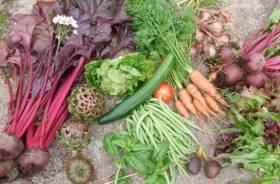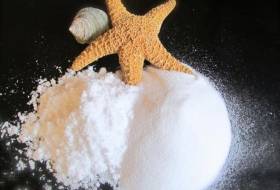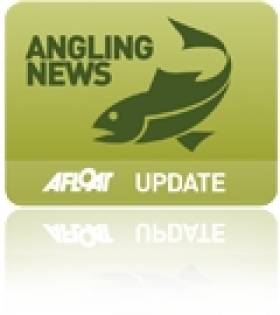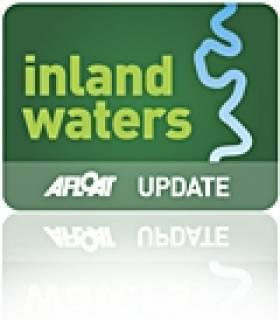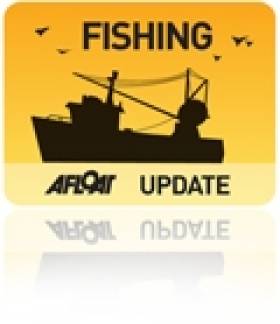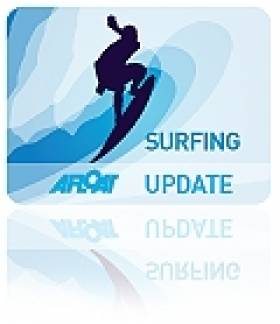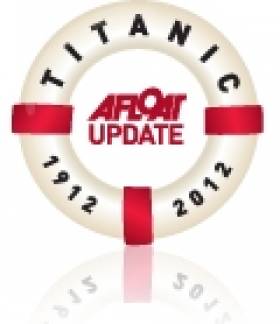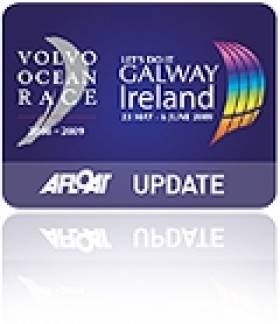Displaying items by tag: Food
‘A Taste Of Lough Derg’ Returns For Fifth Year
#InlandWaters - A Taste of Lough Derg, now in its fifth successive year, will return this summer to feature over 30 food events taking place in villages and towns along the shores of Lough Derg.
The initiative is co-ordinated and supported by the Lough Derg Marketing Group and sees businesses from Clare, Galway and Tipperary coming together to host food events to promote the Lough Derg Lakelands.
The calendar of events was officially launched in the stunning surrounds of Portumna Castle and newly opened tea rooms by Sinead Hennessy, Fáilte Ireland’s food tourism officer, earlier this week.
The series is as a key guide in bringing visitors to the best destinations along the lake where an array of activities are on offer coupled with high quality food experiences and something to suit everyone’s taste buds.
The offerings will entice visitors domestic and international to linger and enjoy the unique and vibrant setting of Lough Derg with events like paddle picnics, ‘taste and make’ chocolate sessions, yoga in nature, ‘meet the cheesemaker’, guided foraging, mindful bread-making, barbecues, garden tours, afternoon tea, tapas nights and much more.
Find out more from the official website for A Taste of Lough Derg.
Oriel Sea Salt Joins European List Of Protected Foods
#SeaSalt - Marine Minister Michael Creed has welcomed the European Commission's approval of the addition of Oriel Sea Salt and Oriel Sea Minerals to the quality register of Protected Designations of Origin (PDO).
“This is great news for the producers of two special products from the bay of Port Oriel in Co Louth," said the minister. "Oriel Sea Salt and Oriel Sea Minerals join the list of recognised and protected EU food names with a unique link to a particular locality in terms of quality, characteristics and tradition.”
The PDO register is a geographical indication, or GI, system that recognises quality foods with traditional connections to places and regions within Europe, such as Champagne in France and feta cheese in Greece.
"The Oriel Sea Salt and Oriel Sea Minerals names will enjoy the same protection recognition as Imokilly Regato PDO, Connemara Hill Lamb PGI and the Waterford Blaa/Blaa PGI," the minister added.
Following national consultation, two further applications had been submitted to the European Commission this year: a PDO application for Sneem black pudding and a PGI application for Wexford blackcurrants.
Acknowledging what's described as a rigorous application process, Minister Creed said that his department was actively engaging with a number of producers with a view to progressing applications to national consultation stage.
“I think that there is real prospect that this engagement could result in Ireland doubling its PDO/PGI products," he said. "I really would also like to see a successful Irish application for Traditional Speciality Guaranteed (TSG) status so that Ireland would feature in each of the three food GI regimes.
"This emphasis on quality recognition is entirely consistent with national policy for the development of the food sector and builds on Ireland’s already strong international reputation as a producer of world class food."
Oriel Sea Salt is harvested from the bay of Port Oriel at Clogherhead in Co Louth. It is almost powder-like to the touch and is naturally crystal white so it does not need to be washed or rinsed.
Oriel Sea Salt is affected by the deep water currents, cleanliness, mineral content and purity of the water in this location.
Harvesting of sea salt in Port Oriel dates back centuries, when salt was a vital ingredient in preserving fish landed at the harbour for consumption, storage and subsequent transport to market.
Oriel Sea Minerals, which are concentrated sea mineral salts in liquid form, also received PDO status this week.
Dublin Bay Prawn Festival Moves To March For St Patrick's Celebrations
#MaritimeFestivals - This year's Dublin Bay Prawn Festival is moving a month earlier to tie in with the St Patrick's festivities in Ireland's capital.
As ever, your favourite prawn dishes will be the star of the show at the food village in the heart of Howth from Friday 18 to Sunday 20 March.
The full programme of events is yet to be announced, but the three days of food and fun are set to kick off once again with the 'mystery dine-around' on Friday 18 March, with a wine reception and courses from some of Howth's finest seafood restaurants. (Tickets priced at €65 per head are going fast.)
In addition, this year's festival will feature an evening of music and dance celebrating Irish, Slovakian and Brazilian culture.
For more details are they are announced, visit the Dublin Bay Prawn Festival website HERE.
Lough Neagh Eels Star Of The Show At NI Angling Fair
#Angling - Derry chef Emmett McCourt looks forward to giving visitors to the Northern Ireland Angling Show a taste of Lough Neagh's world-renowned eels this coming June.
As the top cook tells the Londonderry Sentinel: “Lough Neagh eels are revered around the world as the best there are - but people here [in Ireland] don’t generally eat them.”
McCourt wants to make them the star of the show at the angling expo, which was first held last summer alongside the popular Irish Game Fair on the shores of Ireland's biggest lake.
The joint events are expected to highlight the wealth of local produce and artisan food, not to mention recipes reflecting the traditions of the region.
The 2015 Irish Game Fair and Northern Ireland Angling Show take place over the weekend on 27 and 28 June at Shane’s Castle in Antrim.
'A Taste Of Lough Derg' Promotes Lakelands Food Producers
#InlandWaters - Food producers and restaurant owners surrounding Lough Derg have joined forces in an effort to promote the Lakelands region as a food tourism destination.
A Taste of Lough Derg 2014 is the brand for the pilot initiative that features 13 separate food events taking place in villages and towns along the shores of Lough Derg in counties Clare, Galway and Tipperary from this month till September.
Things gets started tomorrow 13 July in Portumna, right at the top of Lough Derg, when local food producers Sunny Meadow Farm and Killeen Cheese team up for a BBQ and cheese tasting event.
That's followed in the coming days by a 'taste and make' chocolate day at Wilde Irish Chocolates in Tuamgraney, Co Clare, a 'pizza picnic' at River Run House, where the Shannon meets Lough Derg in Terryglass, Co Tipperary, and much more to come.
A brochure with much more about the initiative and planned events over the summer is available to read or download HERE.
Marine Launches Consultation On Food Research Agenda
#Fishing - The Department of Agriculture, Food and the Marine (DAFM) has opened an online consultation process to capture stakeholder inputs to the development of strategic research and innovation agenda (SRIA) for food-related research.
The consultation process concerns two food-related research priorities – Food for Health, and Sustainable Food Production and Processing – that were each identified in the Report of the Research Prioritisation Steering Group.
While the DAFM is particularly interested in receiving submissions from users of research outputs, the process is open to all interested parties - and has particular relevance for the fishing and aquaculture industries in the wake of revisions to the Common Fisheries Policy.
Further details of the consultation process, including instructions on how to make submissions are available on the DAFM website HERE.
The consultation process remains open until 6 March 2014.
Sligo Surf Café Is A Foodie Success
#Surfing - A café-owning couple with twin passions for cooking and surfing have turned their successful business into an equally successful cookbook.
As reported on Surfers Village, Jane and Myles Lamberth were recently featured on the UTV series James Nesbitt's Ireland, which paid a visit to their eatery Shells Café in Strandhill, Co Sligo - a part of Ireland that's become a mecca for surfers the world over.
The Lamberths opened the café in 2010 and its popularity quickly led to the publication last year of The Surf Café Cookbook, featuring recipes for some of their favourite dishes from the menu.
Already a hit in world surfing hotspots from California to South Africa to Australia, its expected to get a bigger boost this summer with large orders from hip US chains.
Surfers Village has more on the story HERE.
Fundraiser to Recreate Titanic's Last Meal
#TITANIC - Every seat has been snapped up for a special black-tie dinner in Galway next month that will recreate one of the last meals served on the Titanic.
Two menus recovered from the ship have provided the inspiration for the RNLI Galway lifeboat fundraiser, devised by self-described Titanic buff and culinary arts lecturer Noel Loughnane.
The extravagant 11-course meal, at €100 per head, includes such mouth-watering delights as filet mignon, foie gras, salmon with mousseline sauce and Calvados-glazed duckling - just as the ill-fated ship's first-class passengers would have enjoyed.
The Irish Times has more on the story HERE.
Volvo Ocean Race in Galway Will See Irish Food in Focus
#VOLVO OCEAN RACE - Top chef Maurice Keller was in Abu Dhabi last week to fly the flag for Irish food at the third stopover of the Volvo Ocean Race, Waterford Today reports.
Keller spent a few days away from Waterford's Arlington Lodge to join members of Good Food Ireland, Tourism Ireland and Irish embassy staff for a special 'Ireland Day' at the VOR Village.
The initiative was designed to promote Ireland as a prime tourist destination ahead of this summer's Volvo Ocean Race visit to Galway.
And food will play a major role in efforts to attract visitors to the finish line in Galway this July, according to the Limerick Post.
Foodies from across the mid-west will converge at a 'Foodie Forum' at the Galway-Mayo Institute of Technology on 2 Feburary, where plans to showcase Irish food in the city will be top of the agenda.
“At the launch of the countdown to the Volvo Ocean Race, the Let's Do It Galway team announced the four main pillars of the race next summer – marine, green, innovation and food," said Cáit Noone, head of the Hotel School at GMIT.
"The food pillar will provide Ireland with a global showcase opportunity to share with the world our food experiences and the outstanding locally sourced produce we have to offer.”
New Owners for 'Iconic' Hotel on Strangford Lough
#WATERFRONT PROPERTY - A 14-bedroom hotel overlooking Strangford Lough has been purchased by the owners of the five-star Merchant Hotel in Belfast.
Caterer and Hotelkeeper reports that the Portaferry Hotel will undergo a £100,000 (€116,700) refurbishment under its new ownership by the Beannchor Group, which is expected to help create 10 new jobs.
Bill Wolsey of the Beannchor Group said he was excited about the prospects for the "iconic" 18-century landmark.
"The restaurant has one of the finest food offerings in the area and I am confident it will be quickly established as a firm favourite with food lovers in the Ards Peninsula and further afield," he said.


























